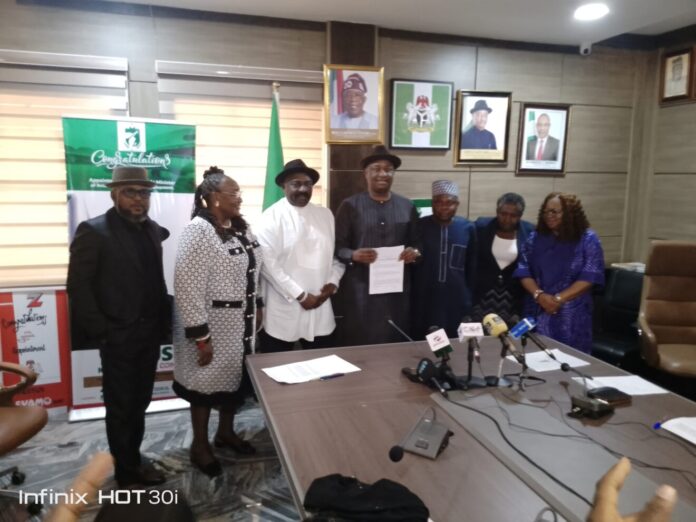The Federal Government has signed the updated Nigeria Civil Aviation Authority (NCAA) procedure to boost operational capacity by enabling airlines to get access to “dry-lease”aircraft.
By Gabriel Agbeja
The Federal Government has signed the updated Nigeria Civil Aviation Authority (NCAA) procedure to boost operational capacity by enabling airlines to get access to “dry-lease”aircraft.
NAN reports that a Dry Lease is an agreement where an aircraft is leased without any accompanying crew, maintenance, or insurance.
Mr Festus Kayamo, the Minister of Aviation and Aerospace Development, who signed the document on Wednesday in Abuja said that the move would enhance Nigeria’s compliance with the international standards.
He said the document, a procedure for Recordation of Irrevocable Deregistration and Export Request Authorisation (IDERA) and registration of aircraft under IDERA would give lessors assurance that their aircraft are safe within Nigerian jurisdiction.
“We are here today, having fulfilled all our judicial obligations, we want to update the administrative rules, and this is what they called, the Advising circular.
“The IDERA is a legal framework that gives aircraft financiers the assurance that, in the event of a default by an operator, they can recover their assets without lengthy legal delays.
“ The updated legal framework stipulates five working days to recover its aircraft. The revised NCAA procedure provides clarity on the recordation of IDERA-related documents.
“It also streamlines the aircraft registration process, and ensures quicker responses to deregistration and export requests,” he said.
The minister said the global international requirement was in line with the Cape Town Convention protocol on de-registration and export request of leased aircrafts.
According to him, Nigeria is part of the Cape Town Convention, but has been left unattended to for a very long time, and has equally left Nigerian aircraft operators on hold.
In his opening address, the Acting Director-General of NCAA, Capt. Chris Najomo, noted that the Cape Town Convention came into force in the United Kingdom on Nov. 1, 2015 through the International Interests in Aircraft Equipment.
According to him, the Cape Town Convention Regulations 2015 aims to reduce the cost of raising finance for large, high value mobile assets which routinely cross borders.
He said that the main impact of the Convention was the ability of the registered owner to request for IDERA over an eligible aircraft as the “authorised party” to de-register and export the aircraft.
“Smooth execution of this authorisation has been impeded by judicial pronouncements and unwilling lessees. The minister has taken bull by the horn in ameliorating consequences of this occurrence, and that is why we are gathered here today.
” Nigeria is a contracting State to the Convention on international interests in eobile Equipment (the Convention) and the protocol there to on matters specific to aircraft equipment (the Protocol),
“Nigeria had made a declaration pursuant to Article XXX(1) of the Protocol providing for the recordation and enforcement of IDERAs,“ he said.
He further said that the Civil Aviation Act (CAR) and the Nigeria CARs made there require NCAA to establish and maintain a legal interest in aircraft registry showing for each aircraft registered in Nigeria, proprietary rights, interests, liens and other dealings thereon.
The News Agency of Nigeria (NAN) reports that the NCAA boss issued an Advisory Circular: NCAA-AC-AWS001A dated 16th October, 2024.
The report intended to provide information and guidance on civil aviation regulatory requirements and procedures for recordation and cancellation of an IDERA .
It also provided information on de-registration of aircraft and exporting aircraft, including aircraft objects located in Nigeria, for purposes of any export remedies. (NAN)




